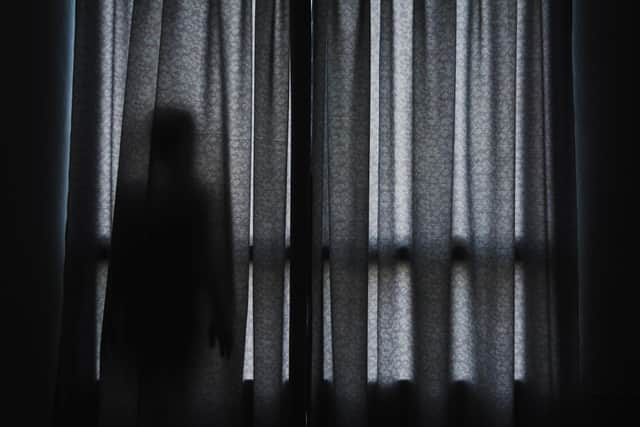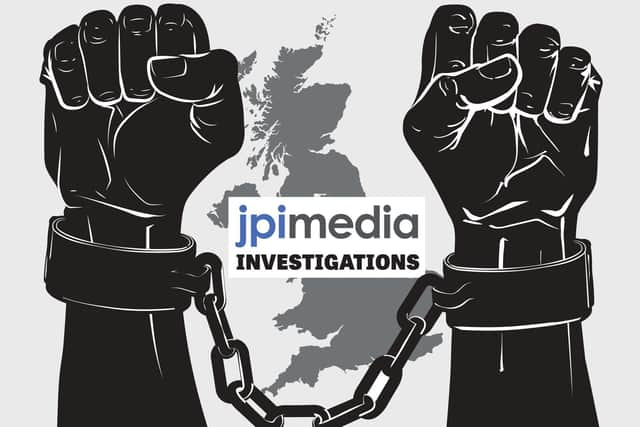Fears grow over sex workers in Portsmouth and Hampshire falling prey to modern slavery
and live on Freeview channel 276
There are fears that lockdown has increased the risk to sex workers as a Covid rules have sent the sex trade further underground. There are also worries that sex workers will become ‘debt-bonded’ to ‘exploiters’.
So a new role, funded by Hampshire police and the county’s police and crime commissioner will work to keep sex workers safe - with the aim of showing that they are victims of the system, and not perpetrators of crimes. It will start by concentrating on Southampton and will then extend its remit to Portsmouth and Andover.
Advertisement
Hide AdAdvertisement
Hide AdIt comes as an investigation by The News and its sister titles has revealed that only five charges have been brought in Hampshire under the Modern Slavery Act 2015.


Despite the law being introduced to great fanfare, while there have been 395 crimes reported in Hampshire since 2015, only five charges have been laid.
Speaking about the sex worker issue, Hampshire Modern Slavery Partnership co-ordinator Kate Davis said: ‘Sex workers aren’t traditionally seen as modern slavery victims and I think a lot of them would say that they aren’t but they are definitely vulnerable to exploitation.
‘It is really hidden still, because you have issues on the streets which are visible but you have brothels, massage parlours and online so that is still extremely hidden. That in itself means they are highly vulnerable to exploitation and grooming as well.
Advertisement
Hide AdAdvertisement
Hide Ad‘During lockdown they were extremely vulnerable. Food banks shut down for a while, sexual health clinics shut down for a while, so they were left in some cases on the poverty line and open to catching Covid due to the nature of the work they do and also STIs.’


Across England and Wales, police forces failed to bring charges for more than 19,000 slavery and trafficking crimes since the 2015 Modern Slavery Act was passed, with suspects facing action in fewer than one in 20 cases.
The landmark legislation was designed to crack down on the crime – which ranges from forced prostitution to labour exploitation and domestic servitude – with simplified offences and tougher punishments.
But our investigation has exposed the extent to which perpetrators are escaping justice, with just 4.4 per cent of modern slavery offences recorded by English and Welsh police forces between 2015 and September 2020 resulting in a charge.
Advertisement
Hide AdAdvertisement
Hide AdIn Hampshire, only 1.3 per cent of offences recorded resulted in a charge, putting the county near the bottom of the list for charge rates.
Sussex and Thames Valley had charge rates of 0.5 and 0.3 per cent respectively.
Lancashire Police came top with 29 per cent charge rate while Gwent Police had a 0 per cent charge rate.
Ms Davis said: ‘Generally it is a real challenge to get a witness testimony. A victim of trafficking and modern slavery is going to be really fearful of any repercussions, whether that be from the threats of violence to their families back home or them themselves. Or what the potential victim sees as repercussions from the authorities in this country.
Advertisement
Hide AdAdvertisement
Hide Ad‘If they are from abroad and aren’t familiar with how police and authorities act here then they might be judging it on what it is like back in their home country which could be corrupt. Traffickers may have said to them that they are the ones that are illegal and they will get in trouble.
‘I think we need to continue with training and awareness with frontline practitioners, including police and social workers, and the public too because the more we try to engage with those high risk communities, the better.
‘It is still a very isolated, hidden crime and we need to be able to engage with them better and say the police are not bad and we are trying to support you. We need to break down those barriers that have probably been built up for years and years and that is tricky.’
The Human Trafficking Foundation, which brings together charities, public bodies and parliamentarians working to tackle slavery, has now said ‘radical’ change is needed to how UK authorities pursue offenders and support victims.
Advertisement
Hide AdAdvertisement
Hide AdTamara Barnett, director of the Human Trafficking Foundation, said modern slavery cases were often ‘very, very difficult’ to investigate and that a lack of wider support for victims means they are often distrustful of and unwilling to work with police.
Radical change, including amending the 2015 Act to lower the threshold of what constitutes modern slavery and better recognise non-violent means of coercion, is needed to improve things, she added.
Safeguarding Minister Victoria Atkins said the Home Office has allocated £2m to support police with modern slavery work this year and had invested £11.3m over the past three years into the Modern Slavery Transformation Programme to boost prosecutions.